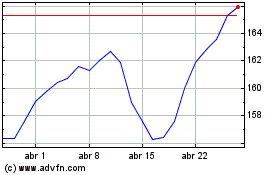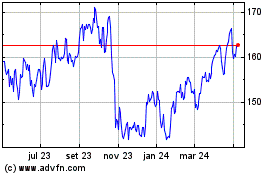
United States Securities and Exchange Commission
Washington, D.C. 20549
Notice of Exempt Solicitation
Pursuant to Rule 14a-103
Name of the Registrant: Chevron Corporation
Name of persons relying on exemption: American Baptist Home Mission
Society
Address of persons relying on exemption: Investor Advocates for Social
Justice, 40 S Fullerton Ave, Montclair, NJ 07042
Written materials are submitted pursuant to Rule 14a-6(g)(1) promulgated
under the Securities Exchange Act of 1934. Submission is not required of this filer under the terms of the Rule, but is made voluntarily
in the interest of public disclosure and consideration of these important issues.
The Proponents urge stockholders to vote FOR Proposal 6, the shareholder
proposal requesting a Human Rights Policy Implementation report at Chevron Corporation’s annual shareholder meeting to be held on
May 29, 2024.
Summary of the Proposal
The Proponents are asking for a report on the effectiveness of Chevron’s
efforts to prevent, mitigate, and remedy actual and potential human rights impacts of its operations due to concerns that the Company’s
current approach is misaligned with its own human rights commitments.
Chevron has a responsibility to identify, assess, and address the real
and potential adverse human rights impacts of its business. The UN Guiding Principles on Business and Human Rights (UNGPs), the global
authoritative framework outlining the roles and responsibilities of states and companies with respect to human rights, require all businesses,
regardless of size or industry, to respect the human rights of stakeholders impacted by their operations and business relationships. The
UNGPs call for businesses to avoid causing or contributing to human rights abuses throughout their operations, and to address negative
impacts when they occur.
Support for this Resolution is warranted and in the best interest
of shareholders because:
| 1. | Failure to conduct effective human rights due diligence has had negative financial and reputational impacts on Chevron; and |
| 2. | Chevron’s existing policies, processes, and disclosure fail to meet its responsibilities related to human rights due diligence
and community engagement. |
| 1. | Failure to conduct effective human rights due diligence has had negative financial and reputational impacts on Chevron. |
Chevron is one of the largest companies in the world, with substantial
business activities in over 25 countries. The scale of its operations has contributed to widespread adverse impacts on the communities
in which it operates, including impacts on human rights, community relations, health, air quality, and water, all of which are identified
by the Sustainability Accounting Standards Board (SASB) as material for the Oil and Gas Exploration and Production sector.1
Three significant examples of Chevron’s negative human rights impacts include:
| ● | As the second largest energy company in the US, and one of the highest greenhouse gas emitters in the world,2
Chevron’s emissions contribute to the climate crisis, which disparately impacts people of color and furthers systemic racism.
Studies have long demonstrated the deep links between the climate crisis and racial injustice.3
Not only are Black, Indigenous, and People of Color (BIPOC) communities exposed to higher levels of environmental pollution, but they
sit at the frontlines of climate impacts such as natural disasters, extreme heat, and droughts.4
Chevron is facing multiple lawsuits from US cities and states alleging damages from climate impacts that disparately affect BIPOC and
marginalized communities. For example, Chevron is a defendant in a case brought by the City of Charleston, SC, alleging “the
consequences of Defendants’ actions disproportionately impact people of color and those living in poverty.”5
Chevron is a defendant of similar lawsuits brought by the State of Delaware;6
the City of Oakland, CA;7
the City of Hoboken, NJ;8
and the District of Columbia9. |
| ● | Indigenous communities in Ecuador hold Chevron responsible for dumping 18 billion gallons of waste in the Amazon rainforest. Chevron
did not deny depositing oil drilling waste in unlined pits on the forest floor, claiming it was standard operating practice at the time.10
Regarded as one of the worst oil-related environmental disasters in history, Chevron’s pollution in Ecuador is linked to negative
environmental and health impacts in surrounding communities.11
This includes elevated rates of cancer, miscarriages, infant mortality, and widespread death of animals and fish.12
In response to a $9.5 billion judgment against the Company (which was later overturned), Chevron reportedly spent $2 billion on legal
attacks against human rights lawyers and Indigenous defendants, which has negatively impacted Chevron’s reputation. The Company’s
efforts to “demonize” Ecuadorian plaintiffs’ attorney, Steven Donziger, is considered a SLAPP (Strategic Lawsuit Against
Public Participation).13
The UN Working Group on Arbitrary Detention determined that Donziger’s resulting detention amounted to arbitrary deprivation of
liberty.14
Chevron has since been identified as one of the most prolific users of SLAPPs as a tactic to evade accountability.15 |
| ● | Chevron’s refinery in Richmond, CA, has faced strong opposition for environmental hazards, health impacts, and safety risks.
Eighty percent of residents living adjacent to Chevron’s facility are people of color, and they experience higher rates of cardiovascular
disease, cancer, and asthma.16
In 2019, the City of Richmond and seven other California municipalities filed a lawsuit against the Company, alleging public nuisance
and negligence, and seeking funds for climate adaptation and resilience.17
In February 2021, Chevron’s Richmond refinery spilled 600 gallons of oil into the San Francisco Bay, renewing calls from community
groups for the city to cut ties with the Company.18
In 2018, Chevron paid $163 million in fines and upgrades to end investigations in four states where the Company’s refineries
caught fire or released harmful chemicals.19
The fine covers a 2012 fire at Chevron’s Richmond, CA, refinery, which resulted in 14,000 evacuations and thousands of hospitalizations
for respiratory distress.20 |
This communication does not seek authority to vote any shareholder’s
proxy, and no proxy cards will be accepted. Please vote your proxies in accordance with the instructions in Chevron’s proxy statement.
| 2. | Chevron’s existing policies, processes, and disclosure fail to meet its responsibilities related to human rights due diligence
and community engagement. |
Though Chevron’s opposition statement claims that its Human Rights
Policy and Operational Excellence Management System (OEMS) manage human rights risks, investors are unable to assess the effectiveness
of these systems in identifying risks, ensuring meaningful stakeholder engagement, reducing negative impacts on communities and the
environment, and providing remedy. Chevron does not disclose any information about the effectiveness of its Stakeholder Engagement and
Issues Management (SEIM) and Environmental Risk Management (ERMP) processes, the groups consulted, how engagement is undertaken, and how
the inputs from that engagement are integrated into its project planning to reduce potential harm. Numerous media reports include statements
from communities indicating they have not been consulted or informed, which shows gaps in scope or implementation.21
Furthermore, Chevron does not align its reporting with the UNGP Reporting
Framework, which would allow stakeholders and investors to understand the effectiveness of its due diligence practices or compare its
performance to peers. Chevron scored 33/100 on the 2023 Corporate Human Rights Benchmark, notably receiving a score of 0 for monitoring
and corrective actions. The benchmark noted “it is not clear how it monitors the implementation of its human rights policy commitments
across its global operations.”22
While Chevron indicates it introduced Grievance Mechanism Guidance in 2016, there is no disclosure on how effectively the system works,
whether stakeholders have access and actually use it, how remedy is provided, and whether negative impacts related to human rights or
the environment have been reduced. Investors are unable to determine if Chevron’s Human Rights Policy or OEMS are effectively implemented,
especially given the pattern and number of penalties, court filings, and protests Chevron faces from fenceline communities. An independent
report would help address this.
Conclusion
Chevron has a
consistent track record of failing to meet its responsibility to respect human rights, which has led to increasing financial and reputational
harm. Repeated incidents of fines, lawsuits, and community opposition demonstrate that Chevron has not been effectively managing these
risks amid increasing public scrutiny. Therefore, Chevron would benefit from the actions requested in the proposal.
Proponents urge all Chevron shareholders to vote FOR Proposal 6 on
Human Rights Policy Implementation and encourage the Company to take action to implement the request of the proposal.
For questions regarding Chevron Proposal 6, please contact: Jillianne
Lyon, Program Director at Investor Advocates for Social Justice and representative of the American Baptist Home Mission Society, via email:
jlyon@iasj.org or phone: 973-509-8800.
This communication does not seek authority to vote any shareholder’s
proxy, and no proxy cards will be accepted. Please vote your proxies in accordance with the instructions in Chevron’s proxy statement.
1
https://sasb.ifrs.org/standards/
2
https://cdn.cdp.net/cdp-production/cms/reports/documents/000/002/327/original/Carbon-Majors-Report-2017.pdf?1501833772
3
https://www.npr.org/2022/03/18/1087581328/understanding-the-link-between-racial-justice-and-the-fight-against-climate-chan
4
https://www.forbes.com/advisor/personal-finance/communities-of-color-and-climate-change/
5
http://blogs2.law.columbia.edu/climate-change-litigation/wp-content/uploads/sites/16/case-documents/2020/20200909_docket-2020CP1003975_complaint.pdf
6
http://climatecasechart.com/case/state-v-bp-america-inc/
7
http://climatecasechart.com/case/people-state-california-v-bp-plc-oakland/
8
http://climatecasechart.com/case/city-of-hoboken-v-exxon-mobil-corp/
9
http://climatecasechart.com/case/district-of-columbia-v-exxon-mobil-corp/
10
https://www.nytimes.com/2003/10/23/business/texaco-goes-on-trial-in-ecuador-pollution-case.html
11
https://www.ncbi.nlm.nih.gov/pmc/articles/PMC8909962/
12
https://www.researchgate.net/publication/330548882_The_Texaco-Chevron_case_in_Ecuador_Law_and_justice_in_the_age_of_globalization
13
https://www.theguardian.com/commentisfree/2022/feb/08/chevron-amazon-ecuador-steven-donziger-erin-brockovich
14
https://www.ohchr.org/sites/default/files/2021-11/A_HRC_WGAD_2021_24_AdvanceEditedVersion.pdf
15
https://earthrights.org/wp-content/uploads/SLAPP-Policy-Brief-2022.pdf
; https://www.forbes.com/sites/morgansimon/2022/05/26/courts-are-not-a-weapon-how-corporations-like-chevron-use-the-law-to-get-their-way/?sh=24c0f00b28c2
16
https://ej4all.org/life-at-the-fenceline
; https://oehha.ca.gov/calenviroscreen/report/calenviroscreen-30
17
https://www.theguardian.com/environment/2019/oct/09/richmond-chevron-california-city-polluter-fossil-fuel
18
https://www.theguardian.com/environment/2021/feb/11/richmond-california-chevron-oil-spill
19
https://www.cbsnews.com/news/chevron-agrees-to-pay-163-million-on-fine-and-upgrades-to-end-probes/
20
https://www.cbsnews.com/news/chevron-agrees-to-pay-163-million-on-fine-and-upgrades-to-end-probes/?utm_content=5bd166ab04d301092828969e
21
https://www.npr.org/2024/03/28/1239650727/chevron-fossil-fuel-richmond-standard-california-news
; https://www.nytimes.com/2021/07/25/world/africa/nigeria-fisherwomen-chevron.html
22
https://www.worldbenchmarkingalliance.org/publication/chrb/companies/chevron-2/
This communication does not seek authority to vote any shareholder’s
proxy, and no proxy cards will be accepted. Please vote your proxies in accordance with the instructions in Chevron’s proxy statement.
Chevron (NYSE:CVX)
Gráfico Histórico do Ativo
De Abr 2024 até Mai 2024

Chevron (NYSE:CVX)
Gráfico Histórico do Ativo
De Mai 2023 até Mai 2024
